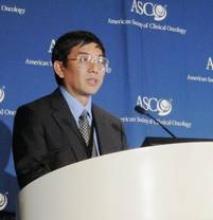CHICAGO – First-line afatinib delayed progression for nearly a year in patients with advanced lung cancer carrying epidermal growth factor mutations, according to much-anticipated results from the phase III LUX-Lung 3 trial.
Median progression-free survival reached 11.1 months with the experimental oral agent, compared with 6.9 months with cisplatin plus pemetrexed (Alimta) chemotherapy (hazard ratio, 0.58; P = .0004), investigators reported. At 1 year, more than twice as many patients were progression free on afatinib (47% vs. 22%).
The median reached 13.6 months in afatinib-treated patients who harbored the most common EGFR (epidermal growth factor receptor) mutations – exon deletion 19 or exon 21 L858R – which account for 90% of all EGFR mutations, but stayed at 6.9 months in the control group (HR, 0.47; P less than .0001). The progression-free survival rate was more than twice as high at 1 year with afatinib (51% vs. 21%).
Patients who were treated with the novel, second-generation TKI (tyrosine kinase inhibitor) also had better sustained tumor shrinkage and improved quality of life than did those treated with standard cisplatin plus pemetrexed chemotherapy, Dr. James Chih-Hsin Yang said at the annual meeting of the American Society of Clinical Oncology.
Overall survival data, from what was described as the largest global prospective trial in EGFR mutation–positive lung cancer to date, are expected in about 18-24 months, he said.
Discussant Benjamin J. Solomon, Ph.D., said, "It’s clear that this study establishes afatinib as another proven option for the first-line treatment of EGFR-mutation–positive patients, alongside gefitinib [Iressa] and erlotinib [Tarceva]."
That afatinib beats chemotherapy is not surprising, added Dr. Solomon of the lung cancer service at Australia’s Peter MacCallum Cancer Centre in East Melbourne, Victoria.
The available data cannot, however, answer questions of how afatinib compares against the first-generation TKIs in this setting, nor whether the increased efficacy outweighs any additional toxicity, he said. Notably, the LUX-Lung 7 trial has begun comparing afatinib 40 mg/day with gefitinib 250 mg/day in EGFR mutation–positive, non–small cell lung cancer.
In the current trial, the efficacy of afatinib came at a cost of increased rates of diarrhea, rash, stomatitis, and paronychia that appear higher than those observed with the first-generation TKIs, Dr. Solomon said. On the other hand, he observed that the investigators appeared to have developed strategies to deal with these side effects, as the rate of afatinib discontinuation was lower than with chemotherapy.
Many Asians, Women in International Trial
LUX-Lung 3 investigators at 133 sites in 25 countries in North and South America, Europe, and Asia randomized 345 chemotherapy-naive patients with stage IIIB or IV adenocarcinoma of the lung and EGFR mutations confirmed by central lab testing. In all, 230 were assigned to afatinib 40 mg daily and 115 to intravenous pemetrexed (500 mg/m2) plus cisplatin (75 mg/m2) every 21 days for up to six cycles.
In all, 61% of patients had an ECOG (Eastern Cooperative Oncology Group) performance status of 1, 65% were women, 72% were Asian, 89% had stage IV disease, 49% had the exon 19 deletion, 40% had the L858R mutation, and 11% had other mutations. Their median age was 61 years. Median follow-up was 16.4 months.
The investigators had hypothesized that afatinib would be stronger than first-generation, reversible EGFR TKIs because it irreversibly binds to and inhibits the entire ErbB family of receptors (ErbB1, HER2, ErbB3, and ErbB4). The ErbB family plays a critical role in tumor cell growth and is overexpressed or mutated in most cancers, including lung, breast, and head and neck cancers.
In all, 56% of afatinib and 22.6% of the chemotherapy patients had an objective response by independent review (P less than .001), said Dr. Yang of the National Taiwan University Hospital in Taipei. The median duration of response was 11.1 months with afatinib vs. 5.5 months with chemotherapy.
There was also a delay in the time to deterioration of the lung cancer–related symptoms of cough (HR, 0.60; P = .007), dyspnea (HR, 0.68; P = .015), and pain (HR, 0.83; P = .19).
A subgroup analysis revealed that the benefit of afatinib on progression extended to most subgroups, including different races and EGFR mutations, never-smokers, and smokers with less than 15 pack-years who had stopped for at least 1 year, he said. Only current and "other" ex-smokers did not benefit.
QoL Better With Afatinib
Quality of life for those treated with afatinib was better than with cisplatin plus pemetrexed in all five domains measured on the EORTC (European Organisation for Research and Treatment of Cancer) Quality of Life Questionnaire-C30 including physical, cognitive, and social functioning.


